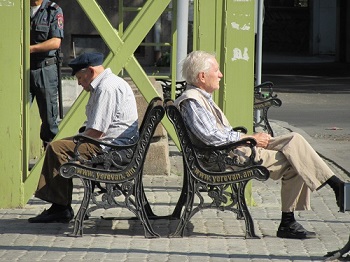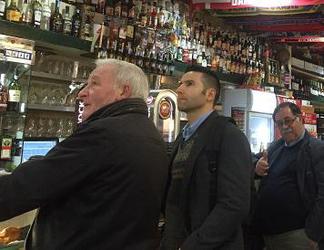Armenia: a bitter-sweet adventure
I am standing in a mini-van, a lady pulls my bag out of my hands and puts it on her lap. My first reaction is resistance, but I see all the seated passengers holding bags to lighten the burden of the ones standing. If someone did this in Amsterdam, they would have been punched on the nose. This is how gentle Armenia is.
Posters in the streets of Yerevan show the numbers 1915–2015 and ‘I remember, I demand’. The year 1915 is anchored so deep in the hearts of the Armenians. They demand recognition and they have many reasons to do so. This is how bitter Armenia can be.
While at night people are holding conversations in the restaurants with live music around the Opera House, a demonstration takes place in front of government buildings on Bagryaman Street, practically around the corner. A huge crowd is protesting against the enormous increase of electricity rates. Sweet and bitter on one night, 500 meters apart.
Lovers Park
On Bagryaman Street, there is the so-called Lovers Park. The park has WIFI! Lovers sitting on the same bench can exchange messages of affection on their smartphones. Unfortunately, some of them will be separated soon by destiny.
According to a rough estimate, three million Armenians live in Armenia, seven million in the diaspora. One million of those live in Los Angeles, nicknamed Los Armenios. Especially, the men work abroad. Armenians are famous for their ability to integrate. No one should be surprised at an Armenian fish shop owner in The Nederlands loudly advertizing “Hollandse nieuwe”, the most Dutch herring dish.
Aznavour’s brother
I get into a taxi and look into the face of the spitting image of Charles Aznavour. “Are you Aznavour’s brother”, I ask and the friendly driver smiles. In a souvenir shop I suggest to the owner selling Aznavour’s busts. He likes the idea and pulls a bottle of vodka from a cupboard. We propose toasts to peace and love and women, we sit and drink, exchange facts and opinions, and establish an eternal friendship. Eternal until he says it’s time to go home. All things must pass, how sweet they may be.
Urban nomad
I am not much of a warrior or a hermit on mountain trips, I am more of an urban nomad and a paladin. Caucaseastan.com invited me to Armenia to give advice on behalf of PUM Netherlands Senior Experts (www.pum.nl). In my free time, I walk the streets of Yerevan and that is an amazing cultural adventure for me.
I am also an epicurean, eating juicy apricots bought from an elderly lady on the market. There are no sweeter apricots in the world than the Armenian ones in June! I eat loads of them until my Armenian colleague says: “open them before you put them into your mouth, there may be worms inside.” I open the next apricot. And good heavens, it has worms. I must have eaten several apricots with worms and did not even notice that they tasted bitter.
Published on caucaseastan.com, 2015, June 24
Armenia: a bitter-sweet adventure Meer lezen »

